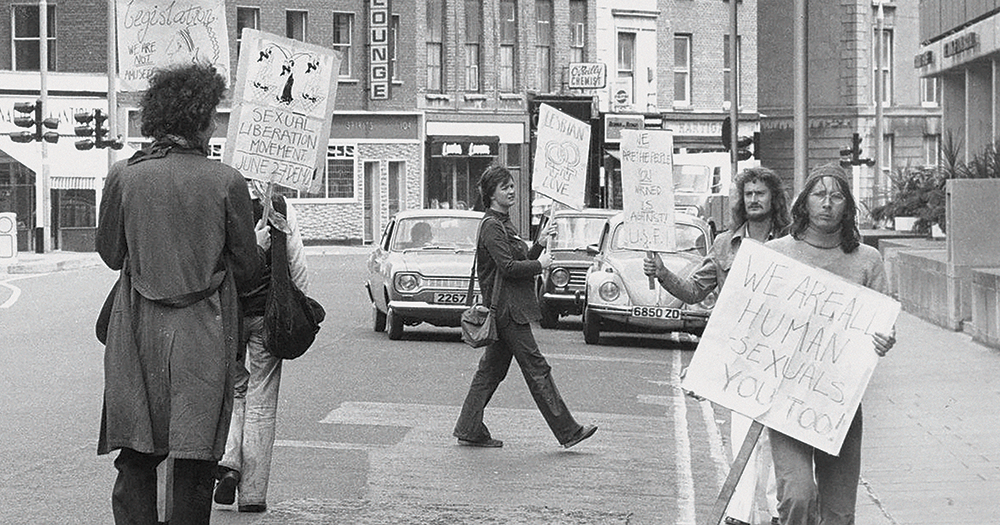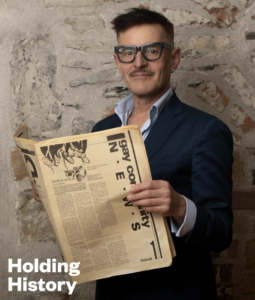Ireland’s first Sexual Liberation Movement started as an undercover meeting between 10 Trinity College students in the final months of 1973. As part of a new series, Ethan Moser interviews the people behind the SLM.
Meeting in a room on Trinity’s Dublin campus, 10 soon-to-be trailblazers gathered to mobilise systemic change in areas including feminism, racism, gay rights, colonialism, art, and literature.
Ruth Riddick, Mary Dorcey, Margaret McWilliams, Irene Brady, Michael Kerrigan, Gerry McNamara, Hugo McManus, Peter Bradley, Edmund Lynch, and David Norris – members of the original Sexual Liberation Movement (SLM) would go on to organise a legendary Symposium in Trinity’s Junior College Room, Ireland’s first Gay Disco, and march for Homosexual Law Reform outside of Ireland’s Department of Justice in 1974.
Throughout 2023, the 50th anniversary of the founding of the SLM, GCN will take a closer look at the past, present, and future of sexual liberation in Ireland through the eyes of SLM’s founding members.
Edmund Lynch, one of the founding members of SLM — as well as Ireland’s first LGBTQ+ publication, Out magazine — is a Dublin-based LGBTQ+ activist who has seen Ireland’s fight for sexual liberation through from the initiation of the SLM in 1973 to the referendum on marriage equality in 2015 and beyond.
In an interview with the Irish LGBTI+ Oral History Project in 2013, Lynch shared his thoughts and experiences working with the SLM, as well as his hopes for the future of sexual liberation in Ireland. Remembering the day he joined his fellow SLM co-founders, Lynch told interviewers: “I had seen a poster in town advertising a meeting in Trinity College, Number 5, Front Square, in 1973. I think it was October. And I went up the stairs and joined 11 other people; no, 10 other people.
“We got together and we decided to form a sexual liberation movement at that time. The last person into the room was David Norris, very flamboyant, you know, hat on him. He came in. Unfortunately, of those people that founded the movement, two people are dead, but that’s nature. Because, after all, it was 40 years ago when we met.”
When asked about the timing of the founding, Lynch noted that the Stonewall Riots in New York City were a huge factor for him. “It was shortly after, two or three years after Stonewall, and gays were beginning to rise. They were beginning to feel it’s time for us to get our rights.”
At the time, there were a number of serious legal and societal restrictions barring LGBTQ+ individuals from equal rights in Irish society, including, perhaps most prominently, The Criminal Law (Amendment) Act.
The law, which, in the UK, made “gross indecency a crime”, was broadly used to prosecute gay men for consensual sex. Lynch elaborated on how the law came to be introduced in Ireland and how it inspired the mission of the SLM.
“Irish people had a high regard for people like Mícheál Mac Liammóir and Hilton Edwards, great time for Roger Casement, the writer and novelist Kate O’Brien, and they didn’t pay much attention to them being gay because it wasn’t being discussed or anything else.
“But we were still under the old British law, which meant we had the situation where we could get life imprisonment or you can get 10 years… And how we had the laws here, it was incorporated into the laws of when we became the Irish Free State in 1922, and then, when we had a referendum in December 1937, we incorporated all the laws, so, basically, it was a carry over, you know. So, we could delete a law. The Criminal Law (Amendment) Act was known as Labouchère Amendment happened in 1895, and that was the situation, and there were times where people were often caught by the gardaí and got heavy imprisonment. But that was the situation. We were criminals until such time as the law was changed in 1993.”
Looking back on all that has changed over the last 50 years, and the legacy that has been left by the SLM, Lynch says that he is hopeful for the future of sexual liberation in Ireland, but emphasises the fact that the future is now in the hands of Ireland’s queer youth.
“People like myself, as you get older, should be forgotten about. It’s up to young people to change the world. It’s not up to me to change it anymore. My time has come and gone.
“It’s no use some snotty-nosed little bastard writing about us in 20 years’ time. We’re all dead. They won’t have a clue what we said, so it’s important that our ideas are all remembered.”
© 2023 GCN (Gay Community News). All rights reserved.
This article was published in the print edition Issue No. 376 (March 1, 2023). Click here to read it now.
Support GCN
GCN is a free, vital resource for Ireland’s LGBTQ+ community since 1988.
GCN is a trading name of National LGBT Federation CLG, a registered charity - Charity Number: 20034580.
GCN relies on the generous support of the community and allies to sustain the crucial work that we do. Producing GCN is costly, and, in an industry which has been hugely impacted by rising costs, we need your support to help sustain and grow this vital resource.
Supporting GCN for as little as €1.99 per month will help us continue our work as Ireland’s free, independent LGBTQ+ media.

